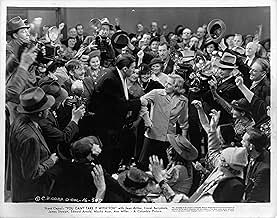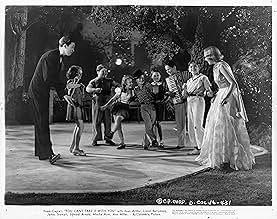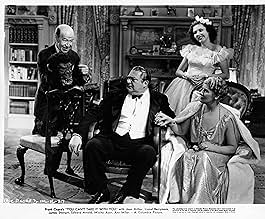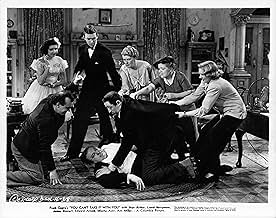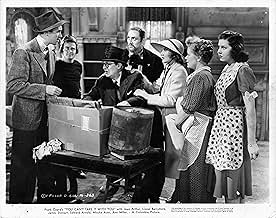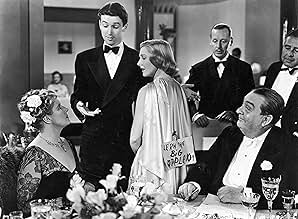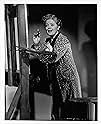Vous ne l'emporterez pas avec vous
Titre original : You Can't Take It with You
- 1938
- Tous publics
- 2h 6min
NOTE IMDb
7,8/10
29 k
MA NOTE
Un homme issu d'une famille riche et snob se fiance à une femme issue d'une famille gentille, mais franchement excentrique.Un homme issu d'une famille riche et snob se fiance à une femme issue d'une famille gentille, mais franchement excentrique.Un homme issu d'une famille riche et snob se fiance à une femme issue d'une famille gentille, mais franchement excentrique.
- Réalisation
- Scénario
- Casting principal
- Récompensé par 2 Oscars
- 6 victoires et 7 nominations au total
Eddie 'Rochester' Anderson
- Donald
- (as Eddie Anderson)
Avis à la une
You Can't Take it With You is a very funny and entertaining film. Bringing Up Baby is probably the only film that has ever made me laugh as hard as this one. James Stewart and Jean Arthur are magical together, just as they were in Mr. Smith Goes to Washington. This is yet another great film by Frank Capra and was rewarded with an Oscar for Best Picture in 1938.
Stewart comes from a rich and completely uptight family. Miss Arthur is the only relatively sane member of a very wild family. Lionel Barrymore is wonderful as the grandfather here. He is so warm and funny in this movie, it's hard to believe he's the same man who played the evil Mr. Potter in It's A Wonderful Life. Edward Arnold who was known for playing slimy villians, is great as Stewart's very wealthy and totally stuck-up father.
Stewart comes from a rich and completely uptight family. Miss Arthur is the only relatively sane member of a very wild family. Lionel Barrymore is wonderful as the grandfather here. He is so warm and funny in this movie, it's hard to believe he's the same man who played the evil Mr. Potter in It's A Wonderful Life. Edward Arnold who was known for playing slimy villians, is great as Stewart's very wealthy and totally stuck-up father.
This is not the play. This is better.
The madcap adventures of a crazy family during the depression is a life affirming film that shows us that money isn't everything and that yes, you can't take it with you.
One of the joys of this film is the cast Lionel Barrymore, Jimmy Stewart, Ann Miller, Dub Taylor, Edward Arnold, Eddie Rochester Anderson, Misha Auer and just about every great supporting actor and actress under the sun, all acting completely and wonderfully mad. They sell the story and make you smile from ear to ear.
I can't be rational where this film is concerned.
Just see it.
You'll feel good for days.
10 out of 10.
The madcap adventures of a crazy family during the depression is a life affirming film that shows us that money isn't everything and that yes, you can't take it with you.
One of the joys of this film is the cast Lionel Barrymore, Jimmy Stewart, Ann Miller, Dub Taylor, Edward Arnold, Eddie Rochester Anderson, Misha Auer and just about every great supporting actor and actress under the sun, all acting completely and wonderfully mad. They sell the story and make you smile from ear to ear.
I can't be rational where this film is concerned.
Just see it.
You'll feel good for days.
10 out of 10.
10mjpooch
For film-goers and movie fans that are from my generation, it is easy for these films to get lost in the shuffle. Ask someone my age, who would now be 25, what the best movie of all time is, they're likely to say Pulp Fiction or Fight Club.
Not to take away from today's movies, but for anyone who has not gone back and viewed classic Capra, such as "You Can't Take it With You," then they are truly missing out.
This movie is pure magic and beauty. Lionel Barrymore gives a performance as relevant in 2005 as it was in 1938. And what can you say about Jimmy Stewart?? This is a rare gem of a film and in true Capra fashion, the climactic final scene brings tear to the eye, much the same way as Harry Bailey's toast in "It's a Wonderful Life."
Not to take away from today's movies, but for anyone who has not gone back and viewed classic Capra, such as "You Can't Take it With You," then they are truly missing out.
This movie is pure magic and beauty. Lionel Barrymore gives a performance as relevant in 2005 as it was in 1938. And what can you say about Jimmy Stewart?? This is a rare gem of a film and in true Capra fashion, the climactic final scene brings tear to the eye, much the same way as Harry Bailey's toast in "It's a Wonderful Life."
With many of the same themes, and indeed many of the same actors, 'You Can't Take It With You' can be considered a sister film to 'It's a Wonderful Life', though preceding it by eight years. It's a romantic comedy but also a study in class differences told at a fascinating point in history, with America still in the Great Depression, and with the world in tumult. A wealthy banker (Edward Arnold) seeks to monopolize the munitions industry prior to the world going to war, but needs to purchase the house owned by eccentrics led by a whimsical old man (Lionel Barrymore). In a convenient coincidence, the banker's son (Jimmy Stewart) is dating the old man's granddaughter (Jean Arthur), and the pair want to get married, so there are two conflicts here.
Barrymore is in the role of the good guy, the one who's figured out that material things are less important than having friends and enjoying life. He also understands that you've got to let people be free to explore themselves, and be who they are. He has a charming scene early on with Arthur, listening to her describe her new love, and reminiscing about his deceased wife. He's also the voice of reason about extremism in the world, commenting that everybody was running out to 'get an ism' to solve their problems, e.g. communism or fascism, as opposed to sticking to the principles of America. "With malice toward none and charity to all," he quotes Lincoln, "Nowadays they say think the way I do or I'll bomb the daylights out of you." It's a wonderful character, and well played by Barrymore.
Jimmy Stewart and Jean Arthur are endearing in their roles as well, and they also turn in very good performances. Watch Arthur's small facial reactions in the aforementioned scene with Barrymore, and later when she's with Stewart when he's clowning around in the restaurant and threatening to scream. The idea that the innovation Stewart's character wants to pursue harvesting energy from the sun's rays like plants really made me smile, seeing as this type of green energy sounded so crazy in 1938. The film isn't bullish on the idea per se, but it gets across the point that it's better to have the courage to follow one's dreams, than it is to bury them in a hum-drum existence.
There is a joy to the film in this house that Barrymore runs, with inventors in the basement letting off firecrackers, Jean Arthur sliding down the bannister, and her sister (Ann Miller) twirling around to her ballet instructor's direction. On the night Stewart decides to drop in on them as a surprise so that his family can see Arthur's in a true light, Miller is dancing about, Barrymore is tossing darts, his daughter (Spring Byington) is working on an awful old painting of hers with one of the guys posing as a Roman discus thrower, and the servants are dancing delightfully in the kitchen. Everyone is simply being themselves. No one cares how good they are, or exactly how they'll monetize what they're doing. They simply do what they want to do, and have fun at it, letting the money sort itself out in some mysterious way that isn't immediately apparent to us.
A lot is made of director Frank Capra's idealism, which may seem naïve to the modern viewer. It's true that this is movie of hope and optimism, but at the same time, Capra was clear-eyed about what was happening in the world. When Barrymore asks the Russian ballet teacher (Mischa Auer) "Did you bring me any Russian stamps?," the latter replies "No, nobody writes to me, they're all dead," which considering Stalin's purges in 1937-38 is a chilling comment slipped in to the script. Capra also recognized the danger of a climate of fear, and through Arthur's character (actually quoting Barrymore's), says that he has a special aversion to those "the people who commercialize on fear, to sell you something you don't need." He's also spot on when it comes to satirizing the ultra-wealthy, and pointing out how unfair the world is when the wealth gap is so large. Edward Arnold's character buys influence in Washington and has a squadron of lawyers and yes-men to help him push his weight around. On the personal side he turns up his nose at the idea of eating humble fare, and his wife (Mary Forbes) haughtily looks down on everyone. As he's about to explain to a bunch of guys in jail how unemployment is "an emotional problem", he tosses a cigar away and a horde of them go after it, which is such a perfect metaphor. Capra was a beacon in the darkness, and with his ability to deliver such stirring social messages in delightful movies - making them work on both levels - he should be considered a genius.
On the other hand, it's interesting that Barrymore's character has such a casual attitude about money, I mean, one does need to be able to eat. It's a little disturbing that when an IRS agent calls on him, he admits that he's never paid income tax because he "doesn't believe in it." He then goes on to ask where all those dollars go, ridiculing the idea that America needs battleships since they haven't been used since the Spanish-American War (hmmm not so prescient in that comment), and not seeing the irony in the fact that his own servants are "on relief." He'll later say that he was just joking about all this, that he doesn't owe the government a dime, but I just thought this smacked of such backwardness, and counter to all of the programs FDR started that were helping Americans. Later we find out that he was once an executive himself, until one day "it struck me that I wasn't having any fun." I admire the sentiment to prioritize life over amassing a fortune since, after all, you can't take it with you, but it seems a little tone deaf to not recognize the need for some amount of wealth to have this luxury.
There are lots of parallels to 'It's a Wonderful Life', including the rich industrialist who has lost his sense of values and is poor in the more important ways in life, the 'little guy' who resists his plans for a monopoly by not selling out to him, and a spontaneous cash collection from friends when one is in trouble. In addition the obvious actors in both films, you'll also find Papa Bailey (Samuel S. Hinds) here, as well as the same raven (Jimmy the raven), who apparently had quite the filmography and collaboration with Capra. In this case Stewart is the scion of the industrialist, not the little guy, and he ultimately quits his dad's company to pursue his own dream, as opposed to finding himself forced to stick around at the ol' Building and Loan. The biggest difference, however is that this film imagines that rich men have souls, and that there is a place deep within that can be reached through friendly overtures and some harmonica music. Perhaps recognizing this was idealistic even by his own standards, it's notable that eight years later, that wasn't the case with Mr. Potter, who was never reached.
Barrymore is in the role of the good guy, the one who's figured out that material things are less important than having friends and enjoying life. He also understands that you've got to let people be free to explore themselves, and be who they are. He has a charming scene early on with Arthur, listening to her describe her new love, and reminiscing about his deceased wife. He's also the voice of reason about extremism in the world, commenting that everybody was running out to 'get an ism' to solve their problems, e.g. communism or fascism, as opposed to sticking to the principles of America. "With malice toward none and charity to all," he quotes Lincoln, "Nowadays they say think the way I do or I'll bomb the daylights out of you." It's a wonderful character, and well played by Barrymore.
Jimmy Stewart and Jean Arthur are endearing in their roles as well, and they also turn in very good performances. Watch Arthur's small facial reactions in the aforementioned scene with Barrymore, and later when she's with Stewart when he's clowning around in the restaurant and threatening to scream. The idea that the innovation Stewart's character wants to pursue harvesting energy from the sun's rays like plants really made me smile, seeing as this type of green energy sounded so crazy in 1938. The film isn't bullish on the idea per se, but it gets across the point that it's better to have the courage to follow one's dreams, than it is to bury them in a hum-drum existence.
There is a joy to the film in this house that Barrymore runs, with inventors in the basement letting off firecrackers, Jean Arthur sliding down the bannister, and her sister (Ann Miller) twirling around to her ballet instructor's direction. On the night Stewart decides to drop in on them as a surprise so that his family can see Arthur's in a true light, Miller is dancing about, Barrymore is tossing darts, his daughter (Spring Byington) is working on an awful old painting of hers with one of the guys posing as a Roman discus thrower, and the servants are dancing delightfully in the kitchen. Everyone is simply being themselves. No one cares how good they are, or exactly how they'll monetize what they're doing. They simply do what they want to do, and have fun at it, letting the money sort itself out in some mysterious way that isn't immediately apparent to us.
A lot is made of director Frank Capra's idealism, which may seem naïve to the modern viewer. It's true that this is movie of hope and optimism, but at the same time, Capra was clear-eyed about what was happening in the world. When Barrymore asks the Russian ballet teacher (Mischa Auer) "Did you bring me any Russian stamps?," the latter replies "No, nobody writes to me, they're all dead," which considering Stalin's purges in 1937-38 is a chilling comment slipped in to the script. Capra also recognized the danger of a climate of fear, and through Arthur's character (actually quoting Barrymore's), says that he has a special aversion to those "the people who commercialize on fear, to sell you something you don't need." He's also spot on when it comes to satirizing the ultra-wealthy, and pointing out how unfair the world is when the wealth gap is so large. Edward Arnold's character buys influence in Washington and has a squadron of lawyers and yes-men to help him push his weight around. On the personal side he turns up his nose at the idea of eating humble fare, and his wife (Mary Forbes) haughtily looks down on everyone. As he's about to explain to a bunch of guys in jail how unemployment is "an emotional problem", he tosses a cigar away and a horde of them go after it, which is such a perfect metaphor. Capra was a beacon in the darkness, and with his ability to deliver such stirring social messages in delightful movies - making them work on both levels - he should be considered a genius.
On the other hand, it's interesting that Barrymore's character has such a casual attitude about money, I mean, one does need to be able to eat. It's a little disturbing that when an IRS agent calls on him, he admits that he's never paid income tax because he "doesn't believe in it." He then goes on to ask where all those dollars go, ridiculing the idea that America needs battleships since they haven't been used since the Spanish-American War (hmmm not so prescient in that comment), and not seeing the irony in the fact that his own servants are "on relief." He'll later say that he was just joking about all this, that he doesn't owe the government a dime, but I just thought this smacked of such backwardness, and counter to all of the programs FDR started that were helping Americans. Later we find out that he was once an executive himself, until one day "it struck me that I wasn't having any fun." I admire the sentiment to prioritize life over amassing a fortune since, after all, you can't take it with you, but it seems a little tone deaf to not recognize the need for some amount of wealth to have this luxury.
There are lots of parallels to 'It's a Wonderful Life', including the rich industrialist who has lost his sense of values and is poor in the more important ways in life, the 'little guy' who resists his plans for a monopoly by not selling out to him, and a spontaneous cash collection from friends when one is in trouble. In addition the obvious actors in both films, you'll also find Papa Bailey (Samuel S. Hinds) here, as well as the same raven (Jimmy the raven), who apparently had quite the filmography and collaboration with Capra. In this case Stewart is the scion of the industrialist, not the little guy, and he ultimately quits his dad's company to pursue his own dream, as opposed to finding himself forced to stick around at the ol' Building and Loan. The biggest difference, however is that this film imagines that rich men have souls, and that there is a place deep within that can be reached through friendly overtures and some harmonica music. Perhaps recognizing this was idealistic even by his own standards, it's notable that eight years later, that wasn't the case with Mr. Potter, who was never reached.
One message. "Nothing is worth doing if you can't enjoy it, and when it's over- you can't take it with you!"
Do any of Capra's works actually speak 'that' one particular message? Perhaps the closest to the above is "It Happened One Night". "Lost Horizon" is about rediscovery and peace of mind. "Mr Smith" is politically and small town oriented and "Mr Deeds" deals with the same except without some political yawn. George Bailey should have had a better dosage of the "You Can't Take it With You" policy in "It's a Wonderful Life".
Here is a play that exercises Frank Capra's famous adage with all humour already built in. Why shouldn't it work?
The stage version was a phenomenal success, written superbly by George S. Kaufman and Moss Hart. If their story is slightly lacking, look no further than the delightful cast of characters. Mr Poppins, toy and mask maker. Alice's Father who meddles with fireworks. Essie the ballerina, Penny the playwright and the wonderful Russian ballet teacher. The uptight Kirby banking corporation. Then there's the "Mr Smith" duo, Tony (Jimmy Stewart) and Alice (Jean Arthur).
The stand out performer here, is naturally the lovable Lionel Barrymore as Grandpa Vanderfhoff. Although the first film in which the damaging effects of his arthritis began to show, Capra had his leg put in a cast and had him move around on crutches. He relishes his performance.
I have heard of complaints which discuss the fact this film fails to address corruption and greed in a similar manner to "Mr. Smith Goes to Washington" which successfully played its part going against the American capital. Once again, Capra emphasises his favourite theme of the little guy up against the world and succeeds, but "You Can't Take it With You" basically does not even make a mild attempt to criticise the American system of government, past or present, even though I know very little about it.
On different levels, look at this film in the light of discussing heavier issues, as the aforementioned greed and corruption. I just don't think Mr Capra would have liked it as much for one of his works to be remembered like that, especially with the basic message staring at us right in the face.
Nevertheless, it is another of Capra's life saving feel good movies. All it is encouraging us to do is to have a little fun.
Rating: 8/10
Do any of Capra's works actually speak 'that' one particular message? Perhaps the closest to the above is "It Happened One Night". "Lost Horizon" is about rediscovery and peace of mind. "Mr Smith" is politically and small town oriented and "Mr Deeds" deals with the same except without some political yawn. George Bailey should have had a better dosage of the "You Can't Take it With You" policy in "It's a Wonderful Life".
Here is a play that exercises Frank Capra's famous adage with all humour already built in. Why shouldn't it work?
The stage version was a phenomenal success, written superbly by George S. Kaufman and Moss Hart. If their story is slightly lacking, look no further than the delightful cast of characters. Mr Poppins, toy and mask maker. Alice's Father who meddles with fireworks. Essie the ballerina, Penny the playwright and the wonderful Russian ballet teacher. The uptight Kirby banking corporation. Then there's the "Mr Smith" duo, Tony (Jimmy Stewart) and Alice (Jean Arthur).
The stand out performer here, is naturally the lovable Lionel Barrymore as Grandpa Vanderfhoff. Although the first film in which the damaging effects of his arthritis began to show, Capra had his leg put in a cast and had him move around on crutches. He relishes his performance.
I have heard of complaints which discuss the fact this film fails to address corruption and greed in a similar manner to "Mr. Smith Goes to Washington" which successfully played its part going against the American capital. Once again, Capra emphasises his favourite theme of the little guy up against the world and succeeds, but "You Can't Take it With You" basically does not even make a mild attempt to criticise the American system of government, past or present, even though I know very little about it.
On different levels, look at this film in the light of discussing heavier issues, as the aforementioned greed and corruption. I just don't think Mr Capra would have liked it as much for one of his works to be remembered like that, especially with the basic message staring at us right in the face.
Nevertheless, it is another of Capra's life saving feel good movies. All it is encouraging us to do is to have a little fun.
Rating: 8/10
Oscars Best Picture Winners, Ranked
Oscars Best Picture Winners, Ranked
See the complete list of Oscars Best Picture winners, ranked by IMDb ratings.
Le saviez-vous
- AnecdotesAnn Miller was only 15 years old when this movie was filmed. Her character is called on to perform numerous (amateur) ballet positions, including dancing en pointe. She had never been trained to do so, and wasn't using shoes with the proper support. She was just forcing her feet up onto their toes, which was very painful for her. She hid this from the cast and crew, but would cry (out of sight) off stage. James Stewart noticed her crying, though he didn't know why, and would have boxes of candy to make her feel better.
- GaffesWhen Alice is in the courtroom, she is wearing a trench coat as newspaper photographers take pictures. In the newspaper pictures, she is not wearing the coat.
- Citations
Grandpa Martin Vanderhof: Lincoln said, "With malice toward none, with charity to all." Nowadays they say, "Think the way I do or I'll bomb the daylights outta you."
- ConnexionsEdited into The Three Stooges Meet Hercules (1962)
- Bandes originalesValse Brilliante Op. 34 No 2
(1838) (uncredited)
Music by Frédéric Chopin
Played on an xylophone by Dub Taylor
Meilleurs choix
Connectez-vous pour évaluer et suivre la liste de favoris afin de recevoir des recommandations personnalisées
- How long is You Can't Take It with You?Alimenté par Alexa
Détails
Box-office
- Budget
- 1 644 736 $US (estimé)
- Durée2 heures 6 minutes
- Couleur
- Rapport de forme
- 1.37 : 1
Contribuer à cette page
Suggérer une modification ou ajouter du contenu manquant

Lacune principale
By what name was Vous ne l'emporterez pas avec vous (1938) officially released in India in English?
Répondre

